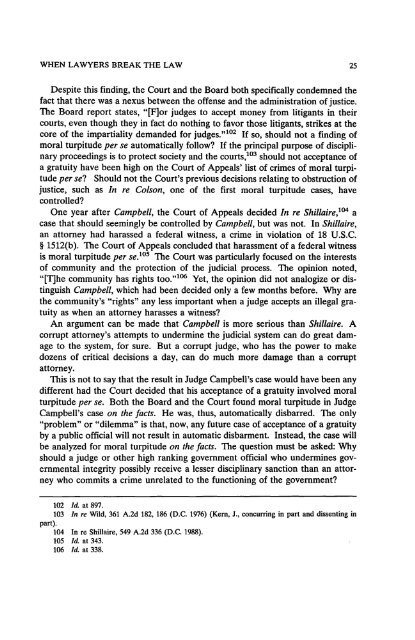The University of the District of Columbia Law ... - UDC Law Review
The University of the District of Columbia Law ... - UDC Law Review
The University of the District of Columbia Law ... - UDC Law Review
You also want an ePaper? Increase the reach of your titles
YUMPU automatically turns print PDFs into web optimized ePapers that Google loves.
WHEN LA WYERS BREAK THE LAW 25Despite this finding, <strong>the</strong> Court and <strong>the</strong> Board both specifically condemned <strong>the</strong>fact that <strong>the</strong>re was a nexus between <strong>the</strong> <strong>of</strong>fense and <strong>the</strong> administration <strong>of</strong> justice.<strong>The</strong> Board report states, "[F]or judges to accept money from litigants in <strong>the</strong>ircourts, even though <strong>the</strong>y in fact do nothing to favor those litigants, strikes at <strong>the</strong>core <strong>of</strong> <strong>the</strong> impartiality demanded for judges.,,102 If so, should not a finding <strong>of</strong>moral turpitude per se automatically follow? If <strong>the</strong> principal purpose <strong>of</strong> disciplinaryproceedings is to protect society and <strong>the</strong> courts,103 should not acceptance <strong>of</strong>a gratuity have been high on <strong>the</strong> Court <strong>of</strong> Appeals' list <strong>of</strong> crimes <strong>of</strong> moral turpitudeper se? Should not <strong>the</strong> Court's previous decisions relating to obstruction <strong>of</strong>justice, such as In re Colson, one <strong>of</strong> <strong>the</strong> first moral turpitude cases, havecontrolled?One year after Campbell, <strong>the</strong> Court <strong>of</strong> Appeals decided In re Shillaire,104 acase that should seemingly be controlled by Campbell, but was not. In Shillaire,an attorney had harassed a federal witness, a crime in violation <strong>of</strong> 18 U.S.C.§ 1512(b). <strong>The</strong> Court <strong>of</strong> Appeals concluded that harassment <strong>of</strong> a federal witnessis moral turpitude per se. lOS <strong>The</strong> Court was particularly focused on <strong>the</strong> interests<strong>of</strong> community and <strong>the</strong> protection <strong>of</strong> <strong>the</strong> judicial process. <strong>The</strong> opinion noted,"[T]he community has rights toO.,,106 Yet, <strong>the</strong> opinion did not analogize or distinguishCampbell, which had been decided only a few months before. Why are<strong>the</strong> community'S "rights" any less important when a judge accepts an illegal gratuityas when an attorney harasses a witness?An argument can be made that Campbell is more serious than Shillaire. Acorrupt attorney's attempts to undermine <strong>the</strong> judicial system can do great damageto <strong>the</strong> system, for sure. But a corrupt judge, who has <strong>the</strong> power to makedozens <strong>of</strong> critical decisions a day, can do much more damage than a corruptattorney.This is not to say that <strong>the</strong> result in Judge Campbell's case would have been anydifferent had <strong>the</strong> Court decided that his acceptance <strong>of</strong> a gratuity involved moralturpitude per se. Both <strong>the</strong> Board and <strong>the</strong> Court found moral turpitude in JudgeCampbell's case on <strong>the</strong> facts. He was, thus, automatically disbarred. <strong>The</strong> only"problem" or "dilemma" is that, now, any future case <strong>of</strong> acceptance <strong>of</strong> a gratuityby a public <strong>of</strong>ficial will not result in automatic disbarment. Instead, <strong>the</strong> case willbe analyzed for moral turpitude on <strong>the</strong> facts. <strong>The</strong> question must be asked: Whyshould a judge or o<strong>the</strong>r high ranking government <strong>of</strong>ficial who undermines governmentalintegrity possibly receive a lesser disciplinary sanction than an attorneywho commits a crime unrelated to <strong>the</strong> functioning <strong>of</strong> <strong>the</strong> government?102 Id. at 897.103 In re Wild, 361 A.2d 182, 186 (D.C. 1976) (Kern, J., concurring in part and dissenting inpart).104 In re Shillaire, 549 A.2d 336 (D.C. 1988).105 Id. at 343.106 Id. at 338.














